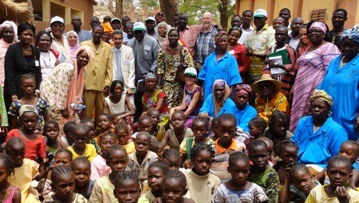Bamako, 31 April 2011 РDelegates at the fifth Annual meeting of the Education sector network of school health and HIV/AIDS focal points in the Economic Community of West African States (ECOWAS) and Mauritania issued a communiqu̩ identifying the positive impact of health and nutrition programmes on quality of member states education systems.
In an effort to mobilise scarce resources and encourage collaboration between government ministries delegates from the 13 ECOWAS nations as well as Mauritania, DRC Congo and Uganda, issued a 14 point recommendation which included the integration of school feeding, deworming, HIV/AIDS and reproductive health into national school health policy. They also called on development partners such as Partnership for Child Development and WHO to provide technical support where necessary to support the development of these integrated school health programmes.
Download the ECOWAS Bamako Communiqué. The conference also heard about the gains that the member countries were making to improve the educational achievement of children through national school health, nutrition and HIV/AIDS prevention programmes.
Download the conference presentations here.  | Conference delegates visiting a
school feeding programme |
Healthy Child InitiativeBuilding on the success of ECOWAS members in actively including HIV prevention into their educational curriculum, a key theme of the conference was integrating wider school health interventions such as school based deworming, malaria control, school feeding programmes that purchase their food from local small holder farmers, early childhood development programmes into national school health policies.
The meeting endorsed this approach through the adoption of the new World Bank-led Healthy Child Initiative. This programme aims to help children realise their potential through age specific school health programmes.
The overall objective of this initiative is to develop a national approach that ensures that children are born healthy and then supported through their development. The World Bank is providing technical support and co-ordination as well as operational support to country projects, and is working to draw in investment from partners.
"All countries present here have made remarkable progress in terms of access of children to school," said Mr Ousmane Diagana, World Bank Country Manager in Mali. "However,a creating the conditions for health education and optimal nutrition will allow children to attend and be alert in school, and thus take advantage of the opportunities afforded to them in learning institutions."
Home Grown School FeedingAs part of the discourse on providing school feeding programmes sourced from local small holder farmers delegates were given a tour of Tienfala school just outside Bamako at which the Ministry of Education has been working with the local community, farming co-operatives, WFP and the school’s management committee to provide lunch time meals and develop cooking and processing facilities.
This local procurement model for school feeding is inline with the work of the Home Grown School Feeding programme, a partnership being lead by Partnership for Child Development, WFP and the World Bank. HGSF programmes are looking to ensure that school children are able to benefit from nutritious locally grown food whilst at the same time the local small holder farmers (many of whose children attend the school) are able to gain access to and profit from the stable market that the school provides.
Read more about the HGSF programmeThis meeting was held in the context of a partnership with the Government of Mali, through the Ministry of education, literacy and national languages, the East African Community (EAC), the Economic Community of Central African States (ECCAS), ECOWAS, the New Partnership for Africa’s Development (NEPAD)/ Comprehensive African Agriculture Development Program (CAADP), the Partnership for Child Development (PCD), the Fast Track Initiative (FTI), UNESCO through the Regional Education Office for Africa (BREDA), the World Bank, and the WHO, Africa Region (WHO/AFRO).
Find out more with these related resources

